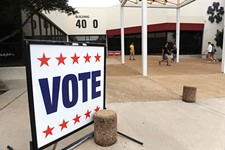Beside the Point
Crazy Toby's Got a Deal for You
By Wells Dunbar, Fri., June 2, 2006
Now it's the city's turn. Who knew one cent could get you $5.8 million?
As springtime swan-songs into summer, last week City Council pitched its sleep-away tent in property-tax minutiae, anticipating the adoption of the annual municipal budget (a couple of months away). The gang sack-raced – more aptly, sack-slogged – through an ambitious budget-policy presentation laying out the city's financial options heading into 2007. As increasingly with all things money, the mood was tempered optimism. There was no shortage of backslapping over one fact – Austin's low ad valorem, i.e., property tax, rates. As the city manager's presentation reflected, the 1993 rate of 64 cents per each $100 of assessed property has plummeted to the current rate of 44.3 cents.
Starting from such a low base, the question 'round the campfire was, "What do we do from here?" There are the annual three choices: Leave it alone, lower it to an "effective" rate (to take in the same amount of money as last year), or float it somewhere in between. Keeping the same, or "nominal," rate isn't a popular option, however, because property taxes are sewn like Peter Pan's shadow to property values – still rising like Tinker Bell – cementing the same rate would effectively increase property tax bills, a doggy-don't for tax hawks like the mayor. To pull in the same amount of revenue as the previous year, while under the rubric of "cutting taxes," the city could go "effective" – in this case, a drop of nearly four full cents, to 40.62 cents.
On first blush, council looks likely to split the difference – if not a couple of heads. At the presentation's tail end, stalking-horse Brewster McCracken made hay with Toby Futrell, saying same time, last year, Council gave the city manager "guidance" as to what the tax rate should be. He was joined by Lee Leffingwell and Betty Dunkerley in calling for the so-called "rollback" rate of 42.12 cents – enough to restore cuts to fledgling services made in the post-millenial downturn, help with additions and public-safety-centered cost drivers Futrell covered, while still technically "cutting taxes," at least on the rate scale. "If we [keep] the effective tax rate, you are saying this is as good as it will ever be, keeping things the same," McCracken said. "As you heard from the council, we have a lot of community needs that are very legitimate. …" Brewster's probably peeved – not because his Tarrytown-by-way-of-the-Woodlands proposal letting cities cap state property taxes sine died at the Lege – but probably because of the CM's unwavering, de facto control over the budget. Her staff produces the annual proposals, effectively framing the tone, and potentially the financial parameters, of the public discussions.
As part of last Thursday's discussion, for example, McCracken's successfully balloted domestic-partner insurance program (that was Prop. 6) came under immediate scrutiny. "This program is about risk," said insurance consultant Michael Rodriguez, wary news for a city where health costs are projected to jump $1 million – before Prop. 6 is even implemented – as part of market increases. Adding the gay mates of city employees is no more of a risk than your average hetero spouse, said Rodriguez; the problem under permissive "Plus One" programs like Travis County's is that oftentimes, someone "in the greatest need of health care" is added. That was enough to make Futrell say she isn't considering Plus One, defined as the "Cadillac" of insurance programs.
Crazy Toby then pulled some low, low prices off the car lot: while the Caddy, at $1.2 million, covers any one adult under the same roof, a $900,000 program allowing for domestic partners and adult relatives is more of a low-wear Honda Accord. A spouse/domestic partner-only plan, at $250,000, is the '84 Toyota Corolla in the back lot, behind the loaners. As Prop. 6 sponsor, M.C. Cracken dreams of grain-gripping and paint-dripping in the Escalade, arguing "for the small cost we are able to really improve the lives, the finances, and the well-being of our city workforce." To say nothing of their spinning rims.
Or nothing of bonds. Taking a cue from the disastrous May 18 meeting, where talks didn't start until past midnight, council cleared its public-discussion calendar solely for bond talk. The usual suspects made their cases – open-space, affordable-housing, and library advocates have been virtuously relentless, along with Mexican American Cultural Center and Zachary Scott Theatre advocates, and those protesting city cuts to the historic Susanna Dickinson home. Accessing the wide desire for more progressive dollars (no thanks to stewing greens like Paul Robbins, et al., whose accusations of a, yes, backroom bond boondoggle involving utility debt, did not appear to help his cause), council weighed the option of a half-penny add to the leveraged bond program, effectively around $10 a year for average Austin homes – which would deliver $55 to $60 million more than the currently staff-projected $536 million. That might provide sufficient wiggle room for the squeakier wheels to get a few drops of expensive grease.
Got something to say on the subject? Send a letter to the editor.










